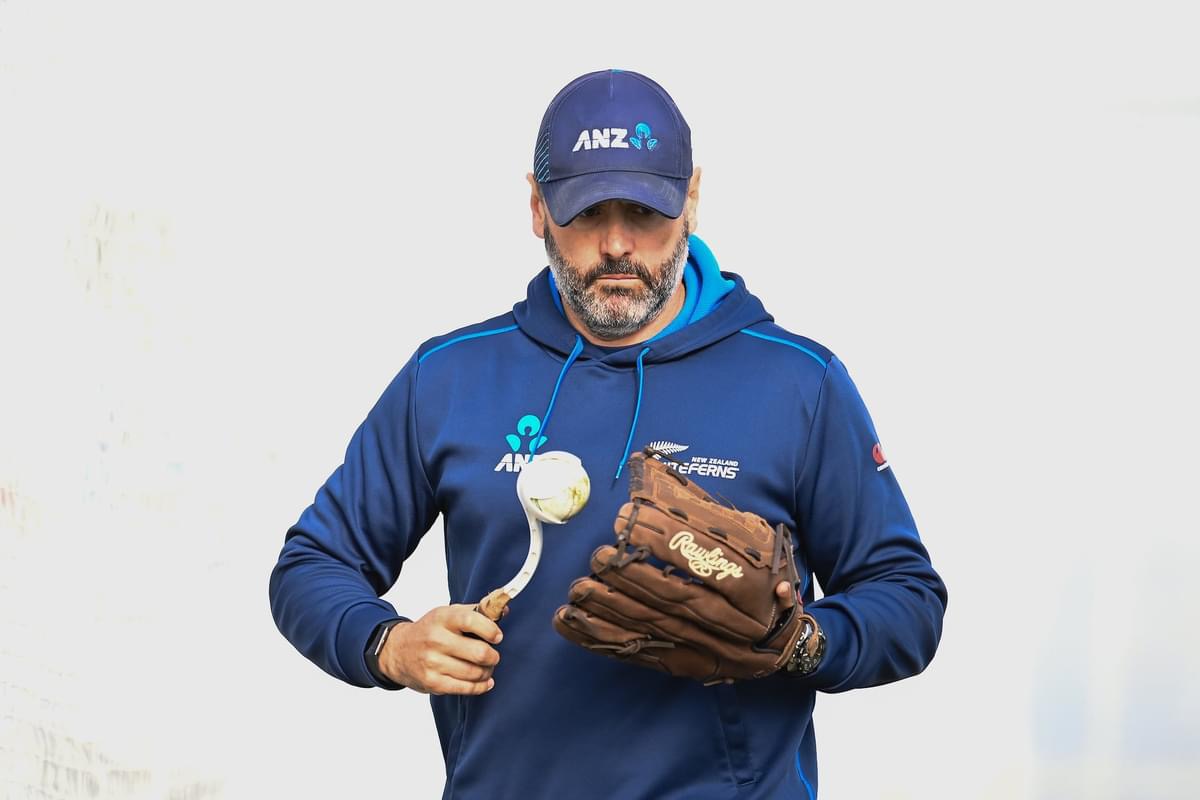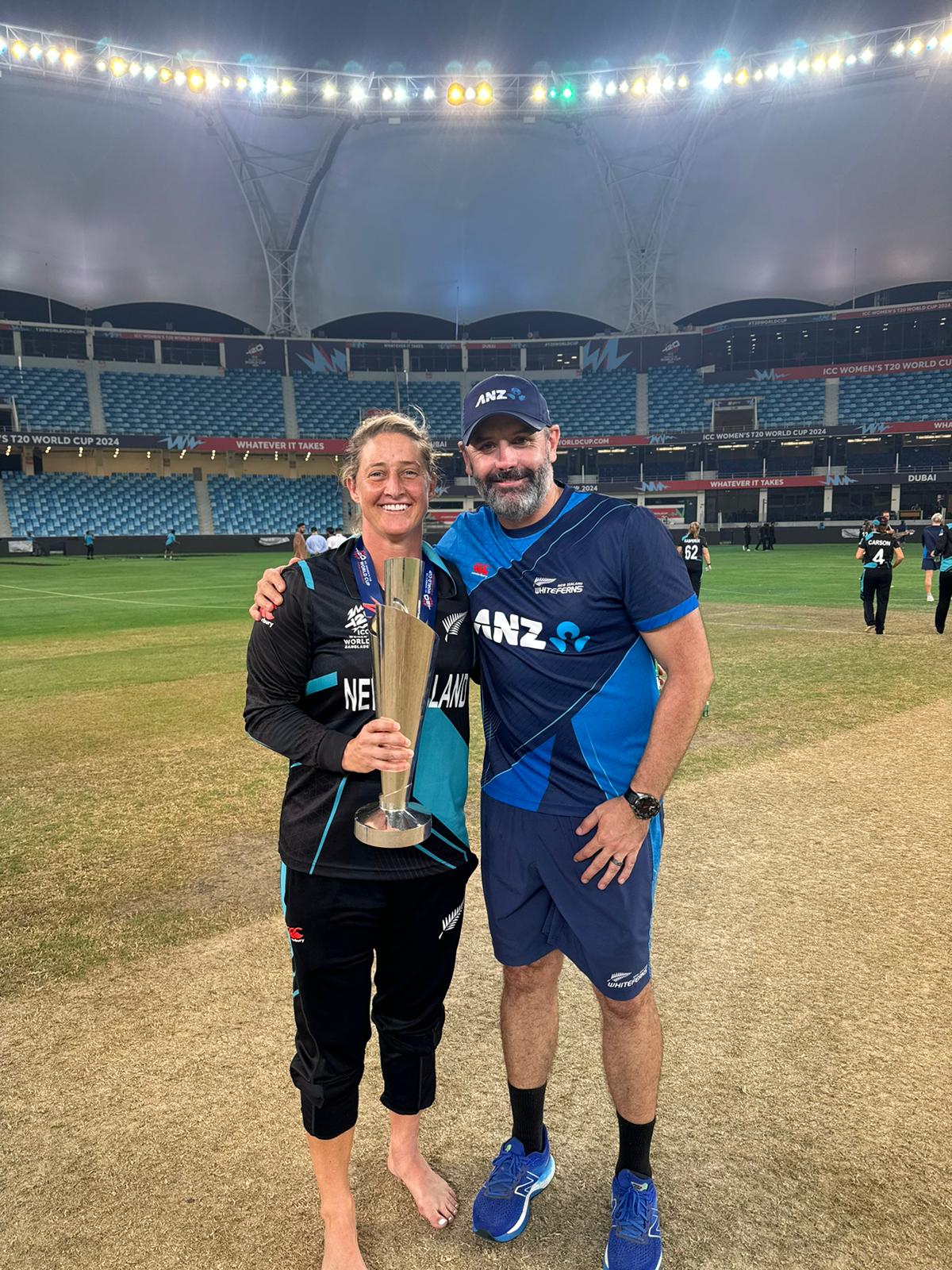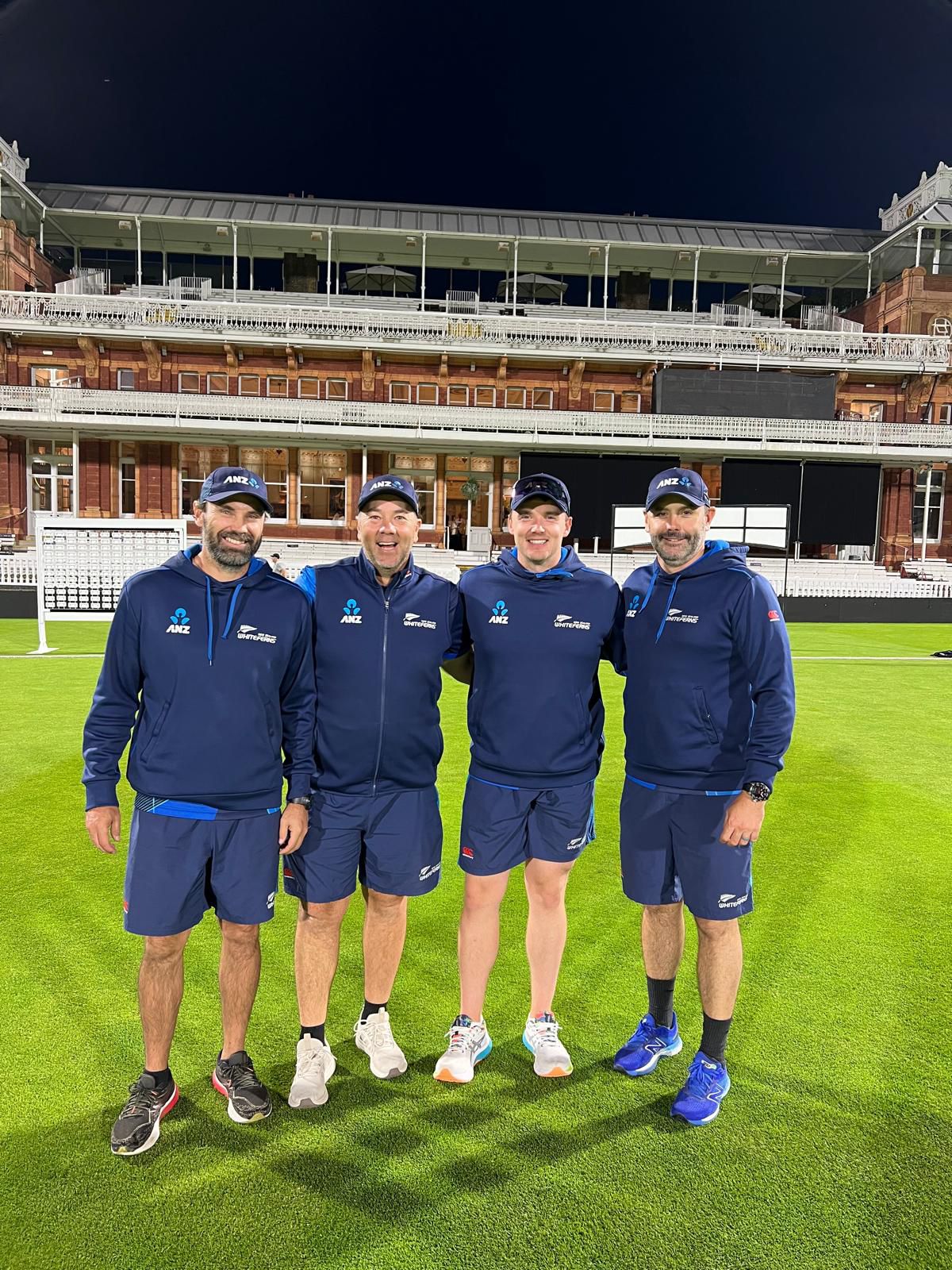Ben Sawyer
Ben Sawyer
- Coach Profile
Following a long list of success stories with other teams, coach Ben Sawyer had to persevere a little longer before his time with the WHITE FERNS turned the cricket world on its head.
On a record 10-game losing streak heading into the United Arab Emirates-hosted T20 World Cup tournament last October, the WHITE FERNS form book went out the window as a much-maligned squad, driven by belief and inspired by a new generation of rising stars, went on to win a first T20 International Cricket Council (ICC) women’s title.
The WHITE FERNS winning the T20 World Cup was in many ways the fairytale sporting moment of 2024, in the process a definitive marker was drawn in the sand for women’s cricket in New Zealand.
Few outside the squad could have predicted they would outlast the ‘big three’ of Australia, England and India to seal a spot in the event’s decider but that’s exactly what they did. In the process, the WHITE FERNS took an ever-growing and passionately engaged New Zealand audience on the most exhilarating of rides in reaching their first ICC final since 2010.
Pragmatic to the core, the success came quicker than expected for Sawyer, 46, who has faced some challenging times in his two years with the WHITE FERNS.

“I thought we’d get there eventually,’’ he said.
“But if I’m being completely honest, did I think we’d win the (T20) World Cup quickly, no I didn’t. Our number one goal heading in was to get out of that pool stage.
“And it’s credit to New Zealand Cricket (NZC) and people like Bryan Stronach and Liz Green, they really gave me that mandate of developing the team, so there was never a huge amount of pressure around the results.
“Obviously, it’s a high performance environment and a national team and you want to win every single game that you play, but we also knew there was bit of a process to go through to get there. And my mandate was to develop the team that was given to me.
“At times people criticised and had a bit of a go at why we were sticking with certain players but it was belief, and after my time with the Australian team, I had seen quite a number of WHITE FERNS come and go, and we all thought with a younger team, if we just stick with them, develop them and maybe give them a little bit more time than normally given to players to succeed, then we would come out the other side.
“Did I think it would happen as quickly? No, I didn’t and was just lucky enough that it did. There will be ups and downs along the way and we understand that while we succeeded earlier than we thought, we’ve probably still got a long way to go.
“We’ve thrown a lot of the younger players in at the deep end and it’s been a struggle for them at times but all credit to the people that came before me that saw something in them and it’s our job as a coaching staff to see that belief through.’’
As a fast bowler, Sawyer played 10 years of first grade cricket through his home town Blacktown Cricket Club in the Sydney competition.
A Physical Education teacher for nearly 20 years combined with a deep love of cricket propelled Sawyer towards coaching at a relatively young age.
“Even when playing I realised pretty early on that I wasn’t going to go as far as you want to as a kid but was very lucky that the club I was at let me work through the coaching ranks there,’’ he said.
“They ended up putting me through my Level 3 with Cricket Australia as probably one of the youngest coaches to go through that because the club backed me and let me coach within the grade system.’’
The strong link between teaching and coaching, with the ever-present backdrop of wanting to see others do well and the enjoyment of seeing that happen, have been the constant drivers for Sawyer across both careers, a true testament of his resilience and willingness to start at the bottom.
In his early days, Sawyer was mostly involved with coaching boys club teams and working his way up through the ranks before progressing to the NSW male U13s, U15s, U16s, U17s and U19s.

Since those days, he has, by chance, predominantly been involved with women’s teams where he has gone on to coach the Sydney Sixers in the Women’s Big Bash League (WBBL), the Birmingham Phoenix in The Hundred (England), the Royal Challengers Bangalore in the WPL (India) while also being assistant coach of the Australian women’s team, and garnering plenty of success along the way.
“Just coincidentally, while I was working in the U17 and U19 programmes, the guy that was the U19s coach was also the assistant coach of the NSW women’s team at the time,’’ Sawyer said.
“They needed some fast bowling, so I did some bowling coaching with them and eventually became their assistant.
“I guess I was just lucky when the (women’s) Big Bash started, I was the assistant coach, Joanne Broadbent, who coached in New Zealand, was the head coach and Sydney had two WBBL teams (Sixers and Thunder) and we each got one, so I started with the Sydney Sixers and started coaching WBBL.’’
The rescheduling of the WBBL tournament pushed Sawyer out of dual career roles and towards coaching fulltime.
In New Zealand as assistant coach of Australia for the 2022 ODI World Cup was when he became aware of the WHITE FERNS head coach position.
“I watched some of the WHITE FERNS and thought they were pretty close in a lot of their games, the job came up and I thought there were some talented players there,’’ he said.
“I’d worked a little bit with Sophie (Devine) in the past in The Hundred tournament and had seen some of the others like Suzie (Bates), Melie (Amelia Kerr), Maddy (Green) and Jess (Kerr) in WBBL, so thought they were a really good group and was keen to get involved.’’
Once landing the job, a rocky two years followed for Sawyer and the team, the coach at times questioning his own pedigree.
“I’ll be honest. I thought I was, at times, the worst coach in the world,’’ he said.
“There was certainly a lean trot with New Zealand and I went through the whole Hundred competition without a win as well in one of the seasons, so you do start to doubt yourself.
“I was thinking, `how am I going to get back into teaching and what am going to do after this.’ I had all those doubts but someone once told me that, `if you’re going to go down, go down your way’, and I guess I’ve just always believed that we had a winning formula.
“We moved Sophie (Devine) around a little bit, played people in different positions and we just thought that gave our team the best chance of success. I guess if I believed in it, then I had to stick it through as well but it’s not easy at times when you’re losing game after game.
“But all credit to the girls. We thought we could push the World Cup, go fairly deep inside it and were lucky enough things fell our way.’’
In the best interests of his family, the Sydneysider has, when not on the road, remained based in Australia which has had no adverse effect on the WHITE FERNS programme but on occasion has drawn criticism from the outside.
“It’s something people bring up often when you’re losing,’’ Sawyer said.

“My wife’s career is really important to her and she travels a lot working for Coca-Cola. With me being away for 200 days last year and she probably does 100 herself, and we have two little boys but are really lucky that my parents live close, my brother lives in the exact same suburb as me and New Zealand Cricket have been kind enough, so that I know when I’m away or Cindy’s away that my kids are looked after.
“It’s a lot of travel and a lot of time away but her job’s just as important to her as mine is to me and NZC have been really accommodating. For me, knowing my kids are looked after hopefully makes me coach a little bit better.
“It’s different but when you’re not winning the first comment on FaceBook is, `he doesn’t even live here’, but the way it is just makes my family life a little bit more comfortable knowing they’re looked after.’’
Sawyer often reaches out to others for advice and keeps in regular touch with a former teaching colleague Matt Cameron, who is CEO of the hugely successful Penrith Panthers National Rugby League (NRL) team.
“They’re an amazing team and an amazing organisation that keep evolving and I recently spent a few days there to see what they do with their high performance and what they do in the wellness space, which is something that really interests me,’’ he said.
“We spent something like 200 days last year on tour, so it’s looking at how we can manage them (players) in that wellness space, how do we look after them, so I spent a bit of time seeing how the Panthers do it. Any chance I can get to do stuff like that, I definitely look at other organisations and how they go about it, and the Panthers are one of the best.’’
Having coached in many different countries while handling an array of cultures, Sawyer believes New Zealand’s size makes for a happy work place.
“It’s been one of the friendliest and most accommodating for me,’’ he said.
“Not just the players but the staff, the whole group. It’s a little bit smaller than Cricket Australia and where I came from but I have really enjoyed that.
“People really get in there and do several jobs, everyone just gets in there and has a go, that’s the real difference with NZC, that ability for everyone to help out, to really care, very friendly people that have been really accommodating for the Aussie coach.’’
Recently reappointed for another two-year term as head coach, Sawyer’s main challenge moving forward is to build, from a comparatively small player pool, on the WHITE FERNS depth of talent.
“It’s no secret that Sophie (Devine), Suzie (Bates) and some of the older players have probably got a couple more seasons left,’’ he said.
“Hopefully they stay on for a while, but that’s the reality and we’ve just got to think about that in itself…..there’s 20,000 international runs that are about to walk out the door.
“One of my really big goals is to make sure that whoever transitions into the WHITE FERNS, especially in that batting group, potentially has a bit of an easier time than some of the girls that have just been through it.
“My biggest job is to make sure that whenever somebody leaves this group, there’s somebody to take their place and is ready, so that’s about creating a bit more depth.’’

From those at the coalface to those outside the cricket square, Sawyer is quick to acknowledge a special trio who have helped shape his coaching career.
“I worked alongside Matt Cameron as a teacher and watched him coaching and teaching at the same time,’’ Sawyer said.
“He became assistant coach of the Paramatta Eels and I just watched how he worked his way through teaching and coaching, then coaching in the NRL and now running one of the best teams (Panthers). I reach out to him a little bit and he’s always willing to give his time.
“Another one, and it’s a bit of a funny connection, is Mike Conway, who used to run The Wiggles (Australian children’s music group). I was at a Cricket Australia conference where he was speaking and he invited me to go and check out The Wiggles studio and I’ve probably been working with him for 10 years now.
“He’s become a bit of a mentor and has had some amazing experiences with The Wiggles. He has got his own company now focused on team building and I’ve learnt a lot from him.’’
Closer to the action, Australian great Ellyse Perry has also been an influential figure.
“I’ve been lucky enough to work alongside Ellyse Perry for a hell of a long time and she’s probably taught me more about coaching than I’ve taught her about cricket,’’ Sawyer said.
“She’s just been an outstanding person to learn off. She’s really inquisitive and we bounce a lot of ideas off each other and is probably someone that shaped my coaching.
“At the start of WBBL, we built the Sixers as a team from scratch, and she was a huge part of that and I still connect with her a little bit for advice.’’